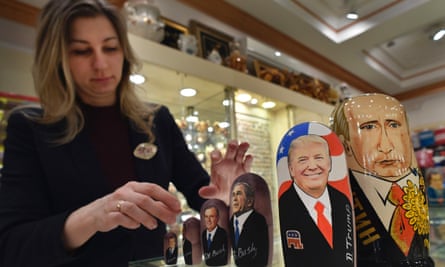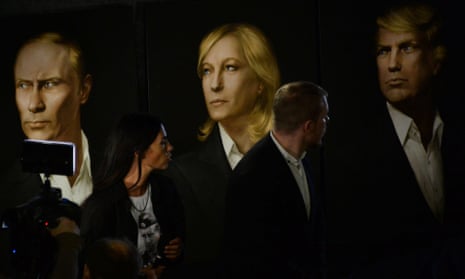Maria Katasonova pointed proudly to the three stylised portraits behind her: versions of Donald Trump, Vladimir Putin and Marine Le Pen, all made to look eerily similar with blond hair and identical outfits. “It’s called Triptych,” she said. “It was painted a year ago, when nobody believed Trump had a chance of winning, except us. Now, it’s a vision of the future.”
It’s a vision that terrifies many in other parts of Europe, but here, people can hardly contain their excitement at the friendly noises Trump is making towards Russia, and the concurrent shakiness of the European liberal consensus.
Katasonova, a nationalist activist who has been backing Trump loudly on social media for months, hosted an inauguration party on Friday evening in a large hall a few hundred metres from the Kremlin. Russian sparkling wine and meat pies were handed around as guests watched coverage from Washington with simultaneous translation into Russian.
Later, at the same venue, there were debates broadcast live on an Orthodox Christian television station, and the launch of a Russian-language biography of Trump, entitled Black Swan.
Russians were also treated to live coverage of the inauguration on state television channels. “I can’t think of another event that has been broadcast in Russia by such a large number of media outlets,” opposition politician Alexey Navalny tweeted.
Putin has loomed menacingly over this US election and its aftermath. While the more spectacular claims of Russian influence on Trump – contained in the dossier compiled by a former MI6 agent and published by Buzzfeed last week – are unsubstantiated and denied by both Trump and the Russians, US intelligence believes with “high confidence” that, at the very least, Russia hacked Democratic party emails and passed them to Wikileaks.

While there have been strong denials and anger over the accusations of meddling, there has also been thinly veiled enjoyment of the attention generated by the claims. At a reception for foreign journalists last week, foreign minister Sergei Lavrov and his spokeswoman made repeated jokes about electoral interference and hacking.
Back in 2005, Putin’s leading strategist, Vladislav Surkov, said it would be preferable to be a real enemy of the west than simply a failed competitor. And by 2016, that was where Russia had arrived.
Now, though, that could all change, as Trump enters the White House bewilderingly inconsistent on almost every policy position except for Russia and Putin, whom he has consistently praised.
Russian officials – from Putin down – have made little secret of their admiration for Trump and his rhetoric, and some of the new president’s words about Russia and the US coming together to solve the world’s problems mirror what Putin has been dreaming of for years.
While in much of the world, Barack Obama had a reputation as a president who was cautious on US interventions abroad, notably with his row-back from the infamous “red line” on Syria, Obama is regarded in Russia as the face of a meddling America bent on world domination.
Most notably, Russian television painted the Obama White House and state department as the progenitors of unrest in Ukraine, and the image of a rapacious White House was a key element of Kremlin propaganda to show Putin as a brave leader fighting off external enemies.
In addition to the specific dislike of Obama, there is also a more general irritation with the post-Soviet settlement and what Putin calls the “unipolar” world that emerged from it, with the US as the undisputed superpower.
The hope in Moscow is that Trump’s repeated disparaging of Nato, and insistence on “America first”, will mean Russia is able to regain a “sphere of influence” in Europe.
“America has been obsessed with leading the world,” said Leonid Reshetnikov, a retired general in Russia’s foreign intelligence service. “It reminds me of the Soviet Union in the 1980s, when we also tried to control the world.
“Donald Trump is an ordinary American and he wanted to end these attempts to interfere everywhere and all the time. The American people have voted for that.”
Katasonova agreed, claiming that Trump’s overblown rhetoric about America will actually mean that other countries are able to shine. “In a multipolar world, America will be great again, but also Russia can be great again and France can be great again.”
Alexander Dugin, a far-right Russian philosopher who has long supported Trump, and of whom the new US president’s chief strategist, Steve Bannon, has spoken positively, said he believed that Putin would now play nice with Trump, in order to win long-desired concessions in Europe and across the world.
“We don’t have to do anything: we just have to not annoy Trump, not make him angry or provoke him with belligerent rhetoric, and everything will fall into our hands, like apples in the autumn. You don’t even need to shake the tree; they just come tumbling down on their own.”











Comments (…)
Sign in or create your Guardian account to join the discussion